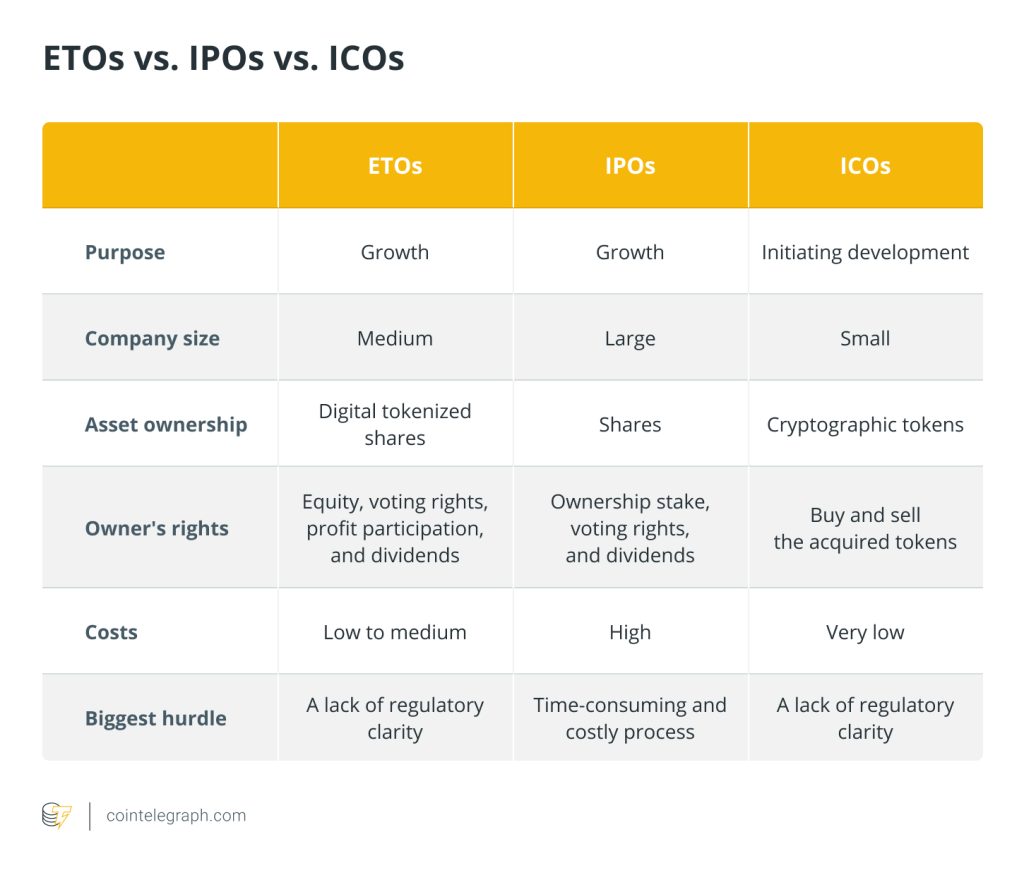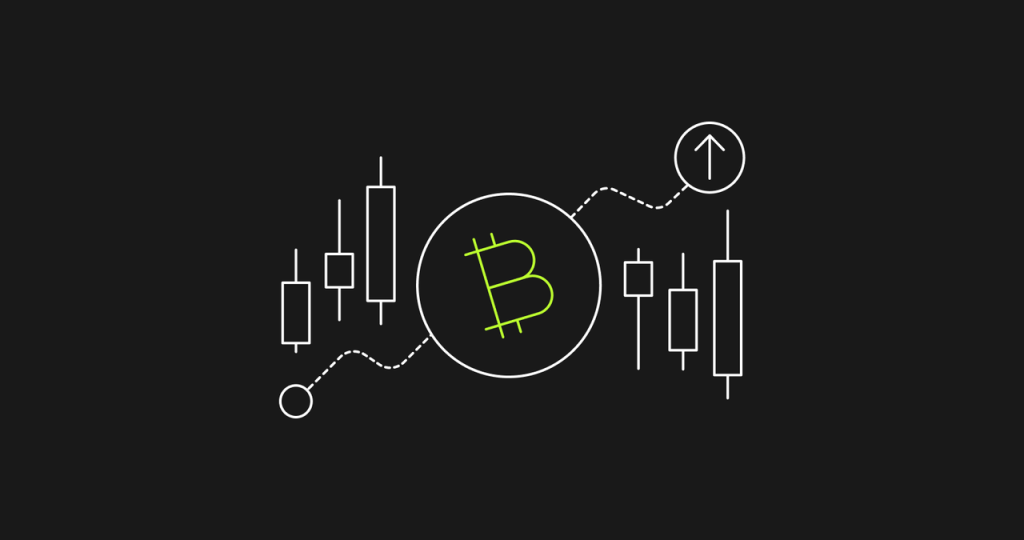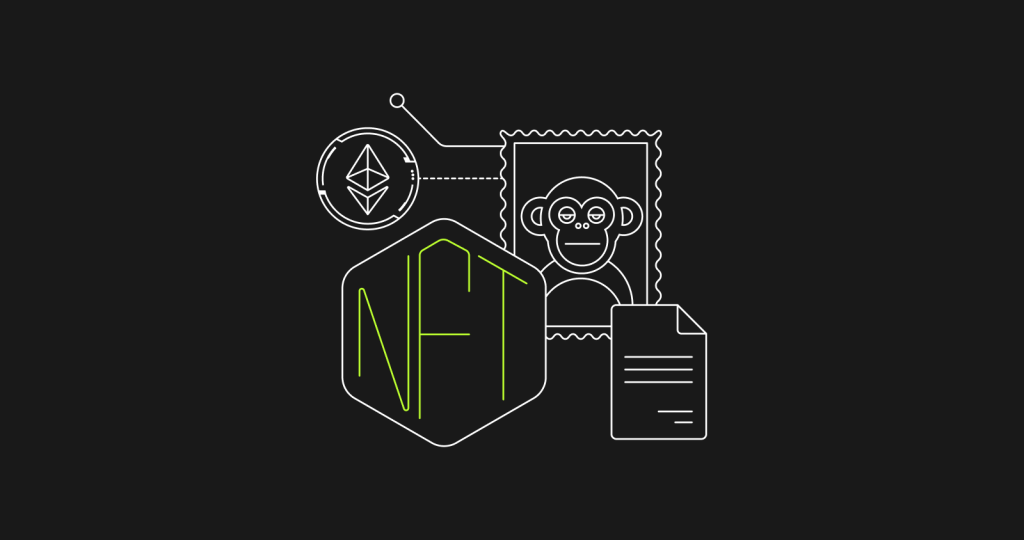A beginner's guide to equity token offerings (ETOs)


What is an equity token offering?
An equity token serves as an equity certificate on the blockchain and is a collection of various blocks (encrypted data). Similar to book-form or conventional equity certificates, equity tokens include the same contractual information, but they are stored on a distributed ledger rather than a share register.
A firm might avoid a traditional initial public offering (IPO) by using blockchain technology and smart contracts to issue shares and voting rights on the blockchain. Moreover, a lender might also generate debt tokens, representing the company's financial obligations, allowing loans to be purchased and sold in a high-liquidity environment.
An equity token is a type of security token (issued during security token offerings or STOs) that reflects ownership in an underlying asset, usually a company's shares. The contract, like shares, specifies the terms and circumstances that apply. Furthermore, the holder of an equity token may be entitled to dividends, voting rights, or both. Contracts, like share certificates, can incorporate appraisal rights, subscription rights and other entitlements.
Additionally, equity tokens could also follow the value of traditional shares and mimic their performance on the blockchain. In this scenario, equity tokens are called crypto derivatives that do not entitle investors to security ownership.
Therefore, equity tokens reflect underlying assets in all circumstances, whether indirectly or directly, distinguishing them from most blockchain coins available through initial coin offerings (ICOs).
Companies selling equity through equity token offerings (ETOs) may be subjected to due diligence by regulators or investment banks to ensure compliance with the fundraising requirements. For instance, the SIX Swiss Exchange's SIX Digital Exchange is one of many equity token exchanges to establish regulated marketplaces for ETOs. Equity token examples include The Elephant Private Equity Coin, Neufund and BFToken.
This article will discuss why equity tokens were created, the benefits of equity tokens and how you can sell equity via ETOs.
Why were equity tokens created?
Equity tokens were created to replace the traditional model of raising funds through IPOs and save investors from ICO scams. Also, tokens issued via ICOs resemble financial instruments, whereas equity tokens may qualify as transferable assets as they are digital representations of underlying securities like derivatives, equities, etc.
For instance, the Markets in Financial Instruments Directive II (MiFID II) in the European Union requires firms to be licensed to issue security tokens in an STO, as they are considered transferable securities. In addition, firms participating in the STO must assess whether they provide any investment services or activities related to the security tokens to comply with the requirements of the MiFID II.
Another advantage of the equity token is that it can be sold in a public or private offering. This considerable flexibility is matched by the possibility of obtaining investor rights, which include the ability to participate in the development of the blockchain network and receive monetary compensation based on how the token performs in the cryptocurrency market.
How are equity tokens issued?
One way of issuing this form of security token is fundraising via tokenizing the company's assets in a private sale. Moreover, tokenized equity can be sold via a public sale of the token during an early seed round. However, the token must be registered on the equity token exchange for this purpose.
Private token sale
When venture capitalist (VC) firms invest in startups in exchange for equity or a share of the company's ownership, the VC firm gets paid out when the company goes public or is sold to another company.
However, Solana (SOL) handed up no equity when they received more than $300 million from Andreessen Horowitz, aka a16z, and Unique Square Ventures. Instead, they sold their VC investors Solana tokens in what is called a private token sale, which is becoming more prevalent among blockchain startups.
The private token sale allows young blockchain-based projects to reap all of the benefits of VC funding without diluting their ownership. At the same time, VC companies profit handsomely by staking, holding and reselling the tokens. So, both parties benefit from this collaboration.
Public offering of tokenized equity
A series of procedures must be followed while offering tokenized equity to the general public. Equity tokens must adhere to each country's ETO legislation to conduct buy and sale campaigns for shares or securities. Follow the below steps to launch an ETO:

Benefits and drawbacks of equity tokens
Equity tokens are beneficial when the required funding amount isn't obtained via a private sale during an ETO. However, it does have some challenges, which are discussed below.
Benefits of equity tokens
Equity tokens are similar to a typical stock offering and stringent regulation make them a safe choice. Such tokens enable you to exert, maintain or delegate control. For example, the sale of assets resulting from the issuance of equity tokens allows buyers to participate or not participate in the decisions made by your firm or activity.
As long as the firm that has issued raised money via an ETO is operational, equity tokens will retain their value. Furthermore, equity tokens allow investors to invest in companies relying on blockchain technologies while complying with the issuing jurisdiction regulator's laws. Additionally, it offers entrepreneurs a new model of funding new offerings.
Drawbacks of equity tokens
The electronic representation of a share is not permitted in several jurisdictions and issuing digital ownership certificates depends on the local laws that apply to the specific type of company seeking to offer a tokenized equity. For instance, what is possible in Germany may not be possible in other countries, such as the United States.
Also, large investors require assurance that all important laws and regulations have been followed, and many investors desire anonymity. Moreover, they are wary of blockchains because they allow third parties to view their investments and transaction values. Therefore, some of them may not want their shares to be managed by a blockchain private key.
ETOs vs. IPOs vs. ICOs
An ETO is a hybrid investment vehicle that combines the benefits of an IPO, an ICO and a VC round into one package. Both IPOs and ETOs must adhere to the laws of the jurisdictions in which they are soliciting investment from the general public.
Equity tokens provide investors and issuers with critical equity-like rights. The entire venture is legal and open, and the company receives more capital to fund development or marketing strategies. At the same time, the investors become actual equity owners in a successful and expanding company with dividend rights.
The benefit of an ETO over an IPO is that it is less expensive and time-consuming for both issuers and potential investors. Depending on the company and its consultants, going public via an IPO can take anywhere from six months to over a year, whereas issuing tokenized equity via an ETO is much quicker and cheaper.
What sets an equity token offering apart from an ICO is that ETOs are for established firms that need more funding to grow. An ETO issuer has already demonstrated its capacity to build a successful firm, and tokenizing a corporation is only another step in the process of setting the scene for future growth. However, when people come together intending to receive financing for developing initiatives, they form ICO projects.
The summary of the differences between ETOs vs. IPOs vs. ICOs is provided in the table below:
The road ahead
To make ETOs a successful way of fundraising for blockchain-based projects, there must be crowdfunding platforms that can adhere to jurisdictional laws while catering to both retail and institutional investors.
Additionally, to find and sell tokenized assets to qualified investors, trustworthy and experienced broker-dealers must be available so that ETO development companies and investors do not get cheated.
As the token economy evolves and regulators formulate global cryptocurrency legislation around the world, it will be interesting to see how the blockchain-based fundraising market matures in the following years and whether it will completely replace traditional IPOs.







… [Trackback]
[…] Find More Information here to that Topic: x.superex.com/academys/beginner/2618/ […]
… [Trackback]
[…] Information on that Topic: x.superex.com/academys/beginner/2618/ […]
… [Trackback]
[…] Read More on on that Topic: x.superex.com/academys/beginner/2618/ […]
… [Trackback]
[…] Read More Information here on that Topic: x.superex.com/academys/beginner/2618/ […]
… [Trackback]
[…] Find More on to that Topic: x.superex.com/academys/beginner/2618/ […]
… [Trackback]
[…] There you can find 24252 more Information to that Topic: x.superex.com/academys/beginner/2618/ […]
… [Trackback]
[…] Find More on on that Topic: x.superex.com/academys/beginner/2618/ […]
… [Trackback]
[…] Read More on on that Topic: x.superex.com/academys/beginner/2618/ […]
… [Trackback]
[…] Here you can find 15792 more Information on that Topic: x.superex.com/academys/beginner/2618/ […]
… [Trackback]
[…] Find More on that Topic: x.superex.com/academys/beginner/2618/ […]
… [Trackback]
[…] Find More Information here to that Topic: x.superex.com/academys/beginner/2618/ […]
… [Trackback]
[…] Find More to that Topic: x.superex.com/academys/beginner/2618/ […]
… [Trackback]
[…] Read More Info here to that Topic: x.superex.com/academys/beginner/2618/ […]
… [Trackback]
[…] There you can find 56474 more Info to that Topic: x.superex.com/academys/beginner/2618/ […]
… [Trackback]
[…] Read More Information here on that Topic: x.superex.com/academys/beginner/2618/ […]
… [Trackback]
[…] Read More here to that Topic: x.superex.com/academys/beginner/2618/ […]
… [Trackback]
[…] Info to that Topic: x.superex.com/academys/beginner/2618/ […]
… [Trackback]
[…] Read More on on that Topic: x.superex.com/academys/beginner/2618/ […]
… [Trackback]
[…] Find More on to that Topic: x.superex.com/academys/beginner/2618/ […]
… [Trackback]
[…] There you will find 39558 additional Information on that Topic: x.superex.com/academys/beginner/2618/ […]
… [Trackback]
[…] Here you can find 75831 additional Info to that Topic: x.superex.com/academys/beginner/2618/ […]
… [Trackback]
[…] Read More here to that Topic: x.superex.com/academys/beginner/2618/ […]
… [Trackback]
[…] Find More Information here to that Topic: x.superex.com/academys/beginner/2618/ […]
… [Trackback]
[…] Information on that Topic: x.superex.com/academys/beginner/2618/ […]
… [Trackback]
[…] Info on that Topic: x.superex.com/academys/beginner/2618/ […]
… [Trackback]
[…] Find More to that Topic: x.superex.com/academys/beginner/2618/ […]
… [Trackback]
[…] Read More Information here on that Topic: x.superex.com/academys/beginner/2618/ […]
… [Trackback]
[…] Read More on that Topic: x.superex.com/academys/beginner/2618/ […]
… [Trackback]
[…] Read More to that Topic: x.superex.com/academys/beginner/2618/ […]
… [Trackback]
[…] Info on that Topic: x.superex.com/academys/beginner/2618/ […]